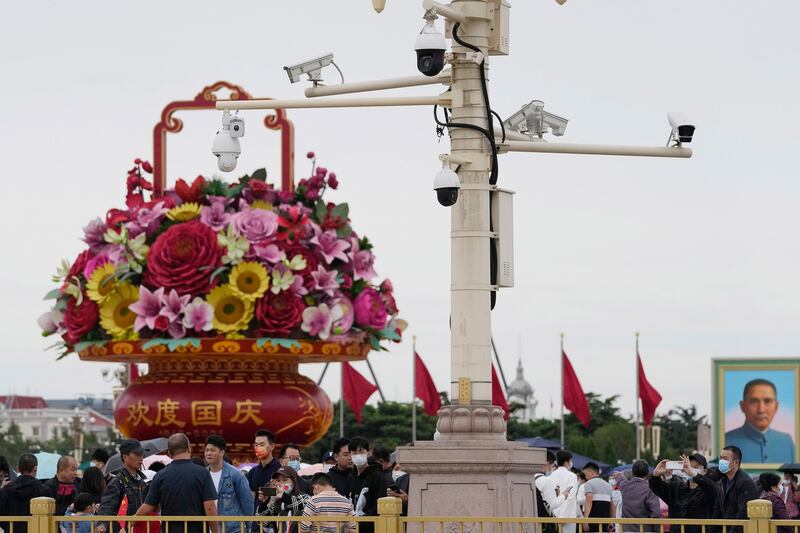China's ruling Communist Party has granted itself more powers under an amended espionage law, expanding the definition of what constitutes "spying," amid ongoing raids on U.S. consultancy firms in China.
The National People's Congress passed amendments to the Counter-Espionage Law on April 26 that broaden the scope of material that can be used to back up allegations of spying.
"Documents, data, materials, and items related to national security and the national interest," are now treated as state secrets under the law, state news agency Xinhua reported.
The raids come amid growing concern that the amended law will give state security police and other investigators new powers to access corporate facilities and electronic equipment. There’s also concern that normal business activities like gathering intelligence on local markets, competitors and partners could be treated as "espionage" amid growing tensions between Beijing, the United States and its allies.
The Chinese authorities have typically employed a highly elastic definition of what constitutes a state secret, and national security charges are frequently leveled at journalists, rights lawyers and activists, often based on material they posted online.
The newly amended law gives no definition of what constitutes a matter of national security or the national interest, but expands the definition of espionage to cover cyberattacks against government departments or critical information infrastructure, Xinhua said.
Under the amendment, authorities may now access data and electronic equipment and issue travel bans to individuals.
The move came as police in Shanghai visited U.S. management consultancy Bain & Co.'s office in Shanghai and questioned staff there.
“We can confirm that the Chinese authorities have questioned staff in our Shanghai office. We are cooperating as appropriate with the Chinese authorities,” Bain & Co. said in a written statement sent to Reuters and the Associated Press on April 26.
Meanwhile, The Financial Times reported that police took away computers and phones but did not detain any employees, and that they had made more than one visit to the office.
Last month, authorities in Beijing raided the office of U.S. due diligence firm Mintz, detaining five Chinese nationals in the process.
Japan seeks clarification
Japan said on Wednesday that it had asked Beijing to clarify exactly which activities constitute espionage, and that it was advising its nationals to be alert regarding the revised law. At least 17 Japanese nationals have been detained in China on "spying" allegations since the law first took effect in 2014.
An employee of Japanese drugmaker Astellas Pharma was detained in March on suspicion of "spying," prompting a protest from Foreign Minister Yoshimasa Hayashi during a visit to Beijing this month.

Jeremy Daum, a senior fellow at Yale Law School's Paul Tsai China Center, told Reuters that the amended law has adopted "an expansive understanding of national security."
The EU Chamber of Commerce in China said the investigation of Bain would affect investor confidence in the wake of three years of stringent pandemic restrictions.
"At a time when China is proactively trying to restore business confidence to attract foreign investment, the actions taken send a very mixed signal," the chamber said in a statement on Friday.
U.S.-based economist Xia Yeliang said Sino-US relations are at their lowest ebb in 50 years.
"There is a kind of us-and-them relationship that is emerging out of tense diplomatic relations and [recent] military and strategic confrontation," Xia said. "China uses its wolf-warrior diplomacy to smear the United States and other Western countries."
"Foreign companies should be sensitive to this risk and divest if necessary," he said.
Rising risk of doing business in China
New York-based lawyer Chen Chuangchuang said the risk of doing business in China is likely to keep on rising with the ongoing clampdown on the flow of information in China under supreme leader Xi Jinping.
"The Chinese market isn't easy to operate in, and if you can manage to get a foothold and stay there, it suggests that your company doesn't ... care about justice or human rights," Chen said.
He said the Chinese authorities already had the ability to surveil and search foreign company executives even before the amendments were passed.
"This has been going on for a long time," Chen said. "It's just that foreign companies feel that they used to enjoy special treatment in China, whereas it was just that they didn't dare to go after them before because they wanted good relations with the United States."
He said it is likely that consultancy firms and other companies gathering information in China could be deemed too sensitive to be allowed to operate there under the current regime.
"It's very simple. Xi Jinping wants to stabilize the country to minimize threats to his [grip on power], so all external contacts must be controlled by the government," he said.
"It all depends on whether you benefit the Chinese Communist Party in any way," Chen said. "If you don't, you'll have to leave."
Translated by Luisetta Mudie.
